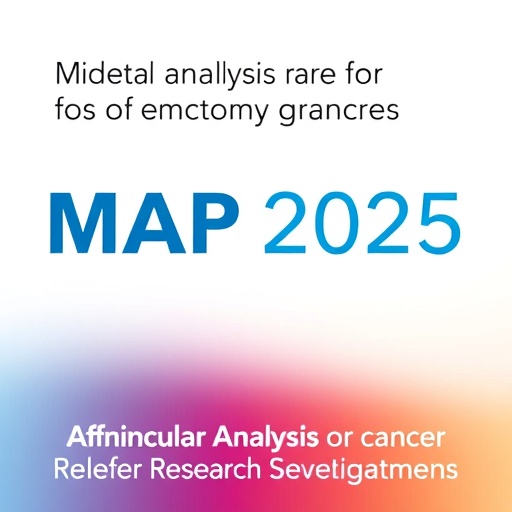Lugano, Switzerland – In an era where precision medicine continues to redefine the landscape of oncology, the forthcoming Molecular Analysis for Precision Oncology Congress 2025 (MAP 2025) promises to deliver groundbreaking insights at the intersection of cancer biology, artificial intelligence, and innovative therapeutic strategies. This highly anticipated event will convene in Paris, France, from September 15 to 16, drawing global experts committed to unraveling the molecular complexities of cancer and translating these discoveries into actionable interventions.
The congress is set to emphasize the expanding role of artificial intelligence in both diagnostics and therapeutics, showcasing pioneering methodologies designed to dissect tumor biology with unprecedented resolution. For instance, recent advances presented at the meeting will delve into the integration of spatial multi-omic mapping technologies in breast cancer research, shedding light on the mechanisms that govern circulating tumor DNA (ctDNA) release. This approach combines genomics, transcriptomics, and proteomics within the native tumor microenvironment, providing a holistic view essential to understanding the progression from early-stage lesions to invasive disease phenotypes.
Central to the congress discourse is the nuanced understanding of immune surveillance dynamics during oncogenesis. New data illuminating T cell behavioral patterns reveal critical modulations occurring well before overt malignancies manifest. By decoding these immune landscape changes at pre-cancerous stages, researchers aim to identify interception points where therapeutic intervention could effectively halt progression, marking a paradigm shift from reactive treatments to proactive cancer prevention.
Artificial intelligence’s role extends also to the development of computational models capable of early cachexia detection in patients with brain tumors. Cachexia, a multifactorial syndrome characterized by severe weight loss and muscle wasting, significantly impairs treatment outcomes. The introduction of AI-powered algorithms that analyze patient-specific data offers a promising route to early identification and management of cachexia, potentially improving quality of life and survival metrics in this vulnerable population.
Adding further complexity to the AI narrative is the concept of digital tumor twins—virtual replicas of an individual’s tumor constructed through integrative data modeling. These digital constructs serve as personalized experimental platforms, enabling simulation of therapeutic responses for cancers of unknown primary origin (CUP). Such innovations herald a new age of precision oncology, where treatments can be tailored with higher specificity and predictive accuracy, substantially augmenting clinical decision-making.
From a genomic perspective, the conference will highlight compelling evidence from clinical trials demonstrating that tumors harboring low levels of genomic alterations often exhibit exceptional responses to targeted therapies. This counterintuitive finding challenges prevailing assumptions that high tumor mutational burden correlates uniformly with treatment sensitivity, instead suggesting a more nuanced interplay between genomic architecture and therapeutic efficacy.
Within the program, a keynote lecture by renowned genomicist Núria López-Bigas will explicate the mutational processes underpinning cancer development. Her discourse promises to elucidate how endogenous and exogenous mutagenic forces sculpt the cancer genome, thereby influencing oncogenic trajectories and informing strategies for early detection and intervention.
Beyond the molecular and computational advances, the congress will also focus on emerging biological themes such as cellular senescence and its dualistic role in tumor suppression and promotion, the influence of aging on cancer susceptibility, and the burgeoning field of cancer metabolism. These topics underscore the intricate, interconnected systems biology at play in oncogenesis, advocating for multidimensional research approaches.
A further thrust at MAP 2025 is the exploration of the microbiome’s impact on tumorigenesis and treatment response. Recent studies suggest that the composition and functional state of microbial communities within patients may modulate immune response and influence drug metabolism, thus representing a fertile area for therapeutic innovation and biomarker development.
The organizers emphasize that this congress will be an exclusively onsite experience, promoting immersive scientific exchange without virtual attendance options. This decision underscores the value placed on face-to-face dialogue in fostering collaborative networks that accelerate translational research breakthroughs.
Complementing the scientific agenda, press accreditation is meticulously managed to ensure accurate dissemination of conference outputs, underscoring the event’s commitment to transparency and engagement with the wider medical community. Accredited journalists will gain privileged access to unveil the nuanced developments set to shape the future of precision oncology.
MAP 2025 stands as a testament to the vital collaboration among leading institutions, including Cancer Research UK, Unicancer, and the European Society for Medical Oncology (ESMO). This synergy exemplifies the global commitment to eradicating cancer through research that spans molecular insights to clinical implementation.
As technology converges with biology, MAP 2025 promises to chart new territories in cancer research, offering hope for earlier diagnosis, more effective prevention strategies, and personalized therapies that reflect the unique molecular signatures of each patient’s disease. The congress underscores that the future of oncology lies at the nexus of integrative science, multidisciplinary expertise, and cutting-edge innovation.
Subject of Research: Precision Oncology, Cancer Genomics, Artificial Intelligence in Cancer Diagnostics and Therapy
Article Title: Pioneering Precision Oncology: Insights from MAP 2025 on AI Integration, Genomics, and Tumor Biology
News Publication Date: August 27, 2025
Web References:
https://www.esmo.org/meeting-calendar/molecular-analysis-for-precision-oncology-congress-2025
https://cslide.ctimeetingtech.com/map2025/attendee/confcal/session/calendar/2025-09-15
Keywords: Oncology, Cancer Genomics, Cancer Screening, Oncogenes, Cancer Proliferation Genes, Molecular Oncology, Artificial Intelligence, Tumor Microenvironment, Cancer Metabolism, Cellular Senescence, Cancer Immunotherapy
Tags: advances in cancer researchartificial intelligence in oncologybreast cancer research innovationsCirculating Tumor DNA Mechanismsgenomics transcriptomics proteomicsImmune Surveillance in CancerMAP Congress 2025Molecular Analysis for Precision OncologySpatial Multi-Omic MappingT Cell Behavioral PatternsTranslational Cancer Therapiestumor biology insights





